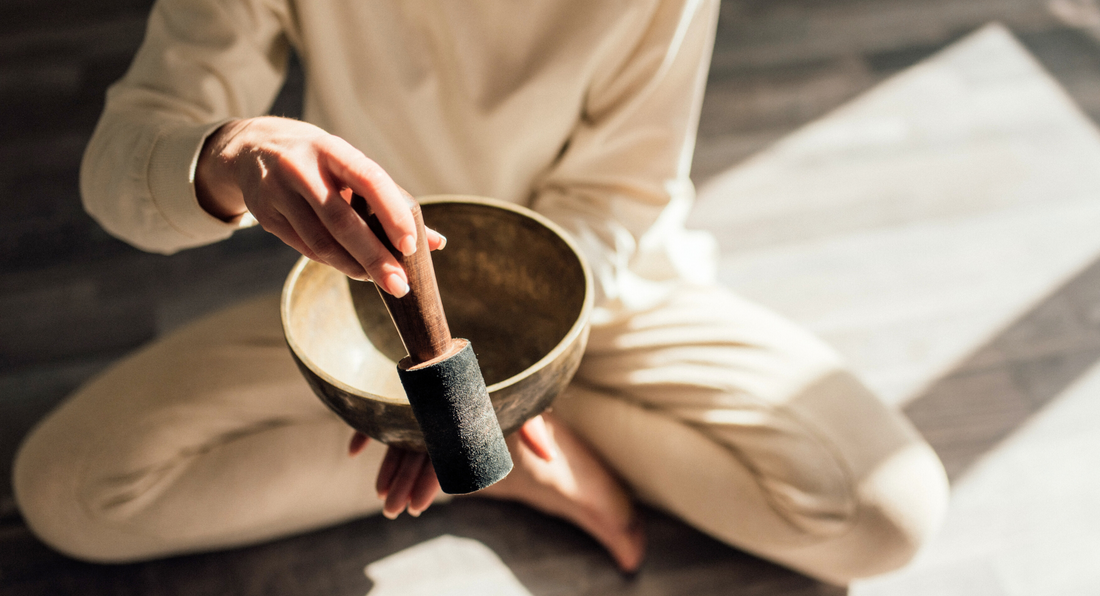Meditation isn’t just a passing trend — it’s a practice that’s transcended time and culture to become widely embraced in modern society. Its popularity is not merely a coincidence, either. It’s a testament to its profound and transformative effects on the mind and body.
Join us as we explore the many benefits of meditation — from melting away stress and anxiety to boosting overall health. And don’t worry — we’ll help you discover unique meditation styles so you can find your groove and make it work for you.
What Is Meditation?
Meditation is a practice that involves training the mind to achieve a heightened state of awareness and focus. While the word “meditation” may conjure images of sitting cross-legged in serene silence, the practice encompasses a range of techniques and approaches, each with its own unique focus and purpose.
The cultivation of mindfulness is central to meditation– the ability to pay attention to the present moment with openness and without judgment. By directing your awareness to your breath, bodily sensations, or the flow of thoughts and emotions, you learn to observe them without becoming entangled or overwhelmed by them.
The Health Benefits of Meditation
Meditation isn't just about finding a moment of relaxation — it's a gateway to a wealth of scientifically proven benefits. Here are the top effects you might experience from embracing a regular meditation practice.
Zap Stress
One of the most common reasons people adopt a meditation practice is to reduce stress levels. When stressed, your body triggers your sympathetic nervous system (aka fight-or-flight response), which increases the release of a stress hormone called cortisol. Usually, this response is self-limiting, but when stressors are frequently (or constantly) present, that fight-or-flight reaction stays turned on.
The long-term activation of this response (and resulting cortisol output) can put you at a higher risk of many health conditions, including anxiety, depression, irritable bowel syndrome, headaches, muscle tension and pain, weight gain, sleep problems, and even heart disease.
Engaging in mindfulness-based meditation practices has been shown to activate the body's relaxation response (aka parasympathetic nervous system), decreasing cortisol release. When practiced consistently, meditation may help you manage stress.
Tame Anxiety and Depression
Feeling on edge? Meditation could help soothe your nerves. In one study, eight weeks of mindfulness meditation reduced symptoms of anxiety in people with generalized anxiety disorder. It also increased positive self-talk and improved stress reactivity and coping.
Research also suggests it may help reduce depression. A review of 18 studies found that those who engaged in meditation experienced reduced symptoms of depression compared to controls.
Enhance Self-Awareness
Understanding yourself and growing into your best self is a journey of a lifetime — and meditation could offer a helping hand. Meditation teaches you to become aware of your thoughts. As you gain greater awareness of unhelpful thoughts daily, you can steer them toward more constructive thoughts and patterns.
There's also a type of meditation called self-inquiry meditation, which aims to help you better understand yourself.
Elevate Your Focus
Meditation is like weight lifting for your attention span. The more you do it, the better you'll become at focusing on the present moment. One study found that people who regularly practiced meditation had a greater attention span than those without meditation experience.
Even more interesting, one review concluded that regularly meditating may reverse brain patterns contributing to mind wandering, worrying, and poor attention.


The Good Stuff - Focus
-
Stimulates cognitive function and mental clarity.
-
Slow-release energy and mood enhancer.
-
Delicious mocha flavor you have to try to believe.
-
Unique formula, only available at For Wellness.
Get More Restful Z's
According to the CDC, about one in three US adults report not getting enough rest or sleep every night, and an estimated 50 to 70 million Americans have chronic sleep disorders.
While not true for everyone, the inability to fall asleep often stems from racing thoughts that appear as soon as your head hits the pillow. One study found that people who meditated experienced less insomnia stayed asleep longer, and had better sleep quality than those who didn't. More specifically, the meditators experienced a reduction of about 44 minutes in total awake time and 4.5 points on the Insomnia Severity Index (ISI) vs. a one-minute reduction in total wake time and no improvement on the ISI scale for non-meditators.
Soothe Pain
Some research suggests that meditation may offer relief for chronic pain, which is often made worse by stress. A large meta-analysis of studies involving nearly 3,500 people found that meditators were better able to cope with pain and experienced a reduced sensation of pain.
Decrease Blood Pressure
Blood pressure is the force exerted by circulating blood against the walls of the blood vessels. When this pressure remains consistently high over time (aka hypertension), it can strain the heart and blood vessels, increasing the risk of atherosclerosis (narrowing of the arteries), stroke, and heart attack.
Interestingly, a meta-analysis of 12 studies involving nearly 1,000 people found that meditation helped lower blood pressure, especially in adults who had high blood pressure prior to the studies. The meditators experienced an approximate reduction of systolic and diastolic blood pressure of 4.26 mm Hg and 2.33 mm Hg, respectively, compared with the control groups.
Get In The Flow
Coined by psychologist Mihaly Csikszentmihalyi, flow is a psychological state characterized by deep immersion, effortless concentration, and heightened focus. Often described as being "in the zone" or experiencing a "peak state," it occurs when you're fully absorbed in an activity, losing track of time and self-consciousness.
Meditation is a powerful training ground for cultivating the ability to enter a flow state. In meditation, you learn to quiet the mind's chatter, cultivate present-moment awareness, and let go of distractions and self-limiting beliefs – all essential to entering a flow state. By repeatedly guiding the mind back to a chosen focal point, such as your breath or bodily sensations, you can strengthen your capacity for sustained attention and heightened concentration, opening the door to flow in your daily life.
Different Types of Meditation: Find What Works For You
Meditation is a deeply personal practice with several techniques and approaches, each offering its own pathway to inner peace and self-awareness. Whether you're a beginner or have been on this journey for a while, a diverse range of meditation techniques are awaiting exploration. Here are some popular forms of meditation (and no, they don't all entail sitting in a quiet room!):
Mindfulness Meditation
Mindfulness meditation involves focusing on the present moment and observing your thoughts, feelings, bodily sensations, and the surrounding environment without judgment. You can practice mindfulness meditation by paying attention to your breath or body sensations or being fully engaged in your activity.
Guided Meditation
Guided meditation involves following the verbal guidance of a teacher, recorded audio, or an app, such as Calm or Headspace. Guided meditations often lead you through relaxation exercises, visualizations, and prompts to help you cultivate mindfulness, reduce stress, and explore specific themes or intentions.
Body Scan Meditation
Body scan meditation involves systematically scanning your body from head to toe, bringing mindful awareness to each part of your body. This practice — usually done lying down or seated with eyes closed — releases tension, promotes relaxation, and cultivates a deeper connection between mind and body.
Breath Awareness Meditation
Breath awareness meditation focuses on observing the natural rhythm of your breath. Follow the sensation of your breath entering and leaving your nose and mouth, using it as an anchor to bring your attention back to the present moment whenever your mind wanders.
Loving-Kindness Meditation
Loving-kindness meditation involves cultivating love, compassion, and goodwill towards yourself and others. From a seated position with your eyes closed, repeat phrases or affirmations of loving-kindness, extending wishes for happiness, health, and peace to yourself, loved ones, and even strangers. You can also think of a time when you felt a positive connection with a loved one, and then let go of the content while holding on to that feeling.
Self-Inquiry Meditation
The crux of self-inquiry meditation is to inquire deeply into the nature of your thoughts, emotions, sensations, and perceptions to gain insight into the true nature of yourself or your consciousness. It's rooted in Buddhist philosophy but can also be approached from a secular perspective.
From a seated position with your eyes closed, begin to silently ask yourself the fundamental question of self-inquiry, such as "Who am I?" or "What is the nature of awareness?" Observe whatever thoughts, emotions, sensations, or perceptions arise in response.
Practice letting go of identification with thoughts, emotions, and sensory experiences. Instead of getting caught up in your mind's content, maintain a sense of witnessing awareness that observes everything with curiosity and detachment.
Movement-Based Meditations
Meditation doesn't only have to entail sitting in silence. You can also try movement-based meditations. These practices encourage an integration of body, breath, and mind. Here are some practices to consider:
- Yoga: This centuries-old practice combines physical postures and breathwork. Through mindful movement and breath awareness, yoga promotes a profound connection between body, mind, and spirit. From gentle restorative yoga to dynamic vinyasa flows, various styles suit everyone's needs and preferences.
- Nature Walks: Immerse yourself in the healing power of nature with mindful walks in natural settings such as parks, forests, or along scenic trails. Nature walks offer an opportunity to quiet the mind, awaken the senses, and reconnect with the earth's beauty and abundance. As you walk mindfully, pay attention to the sights, sounds, and sensations of the natural world, allowing yourself to be fully present in the moment and attuned to the rhythms of nature.
- Tai Chi: Also known as "meditation in motion," Tai Chi is an ancient Chinese martial art characterized by slow, flowing movements and deep breathing. Rooted in balance, harmony, and energy cultivation principles, Tai Chi promotes relaxation, stress reduction, and physical vitality.
- Qigong: Similar to Tai Chi, Qigong is a mind-body practice integrating gentle movements, breathwork, and visualization techniques to cultivate Qi or life energy. Through slow, deliberate movements and focused attention, Qigong is thought to harmonize the flow of Qi within the body, promoting health, vitality, and emotional well-being.
- Dance: Dance meditation combines movement, music, and mindfulness to create a dynamic and liberating practice. Put on some music and let the rhythm guide your body. This doesn't have to look pretty or cool! Release your inhibitions and let your body go with the flow.
Art Meditation
Creativity and mindfulness converge in art meditation, where you express yourself through artistic mediums such as painting, drawing, or sculpting. This practice encourages exploration, experimentation, and self-discovery, providing a unique avenue for personal growth and introspection.
Supercharge Your Meditation With For Wellness
Staying focused is the key to meditation. But don't fret if your mind drifts during practice—it's perfectly normal and expected. Acknowledge the wandering thoughts and gently guide your attention back to your focal point, whether it's your breath, your body sensations, or the sights around you.
To help tame your wandering mind, try For Wellness' two focus-enhancing products:
- The Good Stuff™ Focus: A mocha-flavored powder featuring theobromine, a cocoa extract that can enhance focus and learning (among other functional ingredients). Mix a scoop into coffee, tea, or a smoothie before meditation for a brain and body boost! 🧠
- Superfood Focus Bites: These sweet tooth-satisfying bites feature lion's mane mushroom, which has been shown to support brain function and focus. Enjoy them as a pre-meditation snack to help bring forth a sense of focus and calmness 😊✌🏼
🧘🏽♀️Ready to give meditation a try? Go for it! With so much to gain and nothing to lose, this is a practice worth embracing.
Byline: Written by Katie Koschalk, a health and wellness writer, certified holistic nutritionist, and certified personal trainer based in California.










